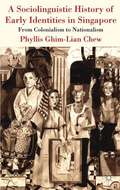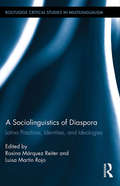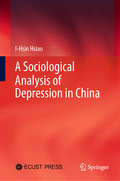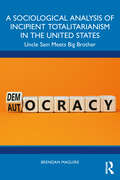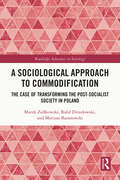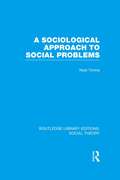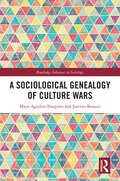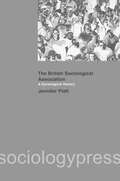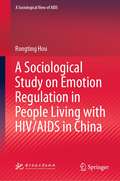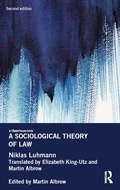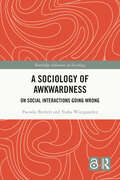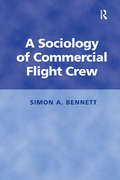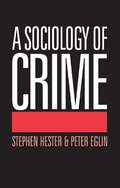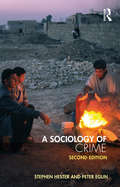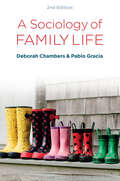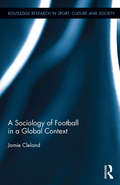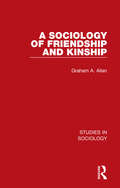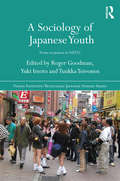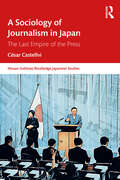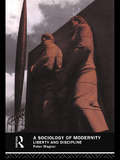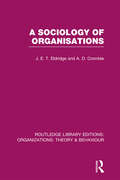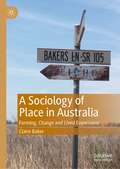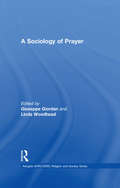- Table View
- List View
A Sociolinguistic History of Early Identities in Singapore
by Phyllis Ghim-Lian ChewWhat role does race, geography, religion, orthography and nationalism play in the crafting of identities? What are the origins of Singlish? This book offers a thorough investigation of old and new identities in Asia's most global city, examined through the lens of language.
A Sociolinguistics of Diaspora: Latino Practices, Identities, and Ideologies (Routledge Critical Studies in Multilingualism)
by Rosina M Luisa MartThis volume brings together scholars in sociolinguistics and the sociology of new media and mobile technologies who are working on different social and communicative aspects of the Latino diaspora. There is new interest in the ways in which migrants negotiate and renegotiate identities through their continued interactions with their own culture back home, in the host country, in similar diaspora elsewhere, and with the various "new" cultures of the receiving country. This collection focuses on two broad political and social contexts: the established Latino communities in urban settings in North America and newer Latin American communities in Europe and the Middle East. It explores the role of migration/diaspora in transforming linguistic practices, ideologies, and identities.
A Sociological Analysis of Depression in China
by I-Hsin HsiaoThis book explores the relationship between macro-social structure, social construction and micro-healthcare behaviors. It constructs a two-layered and two-faceted sociological analytical framework to analyze the causes of depression in China and account for the comparatively low rate of depression in the country, and provides a sociological interpretation of depression in China from a global perspective that has rarely been adopted in previous sociological studies in China. Presenting first-hand data and case studies, it describes and analyzes patients’ subjective experience and actions as well as physicians’ viewpoints. It also includes interviews with 34 patients, 4 family members, 3 psychological consultants and 5 psychiatrists.Offering an integrated interpretation of depression in China from the perspectives of sociology, medical science and psychology, this book is intended primarily, but not exclusively, for the growing body of researchers and students who are looking for ways of analyzing depression, especially in China. It is also a valuable resource for practitioners working in the field.
A Sociological Analysis of Incipient Totalitarianism in the United States: Uncle Sam Meets Big Brother
by Brendan MaguireUsing George Orwell’s novel Nineteen Eighty-Four as a guide for interpreting the role of the American state in the twenty-first century – paying particular attention to how the government responded to the life and death issues of terrorism, COVID-19, and climate change – this book presents eye-opening and compelling documentary evidence that suggests Orwellian policies have already been implemented by Republicans and Democrats.A Sociological Analysis of Incipient Totalitarianism in the United States advances a groundbreaking sociological explanation for how totalitarian rule is embraced by the public when freedom, equality, and justice are compromised, offering a sociological explanation of how totalitarian rule is operationalized from the macro level to the micro level, using concepts associated with Marx (ruling ideas), Mead (generalized other) and Berger and Luckmann (recipe knowledge) which are especially key to understanding the process. Finally, the book suggests policies that could halt and reverse the progression of totalitarianism in the United States.Scholarly and yet readily accessible to a general readership, this book showcases the sociological importance and enduring influence of Orwell – working as a supplement to Orwell’s Nineteen Eighty-Four and making a meaningful contribution to the public discourse by challenging and informing students and the public about the very real fears of creeping totalitarianism in the United States.
A Sociological Approach to Commodification: The Case of Transforming the Post-Socialist Society in Poland (Routledge Advances in Sociology)
by Marek Ziółkowski Rafał Drozdowski Mariusz BaranowskiThis book analyses the processes of commodification and decommodification which have wrought changes in Polish society since 1945. Examining the case of Poland, this book also explores comparisons to other countries in the Eastern European region. It is the first book to capture long-term social change from the perspective of commodification and decommodification processes. This book will appeal to sociologists, economists, historians, anthropologists and political scientists, especially to students and scholars interested in theoretical economics and economic sociology as well as Central and Eastern Europe.
A Sociological Approach to Social Problems (Routledge Library Editions: Social Theory)
by Noel TimmsThe topics covered in this book are directly related to much of the misunderstanding of what sociology is about. It is usual nowadays to label as sociological any discussion concerned, however loosely, with ‘Society’. But a careful reading of Mr Timms’ treatment of the problem areas he has chosen should make clear the difference between this use of the adjective in everyday speech, and its more vigorous technical use. In dealing with his subject Mr Timms makes use of the concepts of sociology such as ‘role’, ‘norms’, ‘social control’, ‘class’, and ‘family’.
A Sociological Genealogy of Culture Wars (Routledge Advances in Sociology)
by Maya Aguiluz-Ibargüen Josetxo BeriainThis book analyzes the culture wars as those struggles for the monopoly of the legitimate representation of the world in the normative elucidation of controversial issues linked to values. Public culture in this context would consist of a set of complex classificatory systems of symbols and meanings that constitute a semantic field in permanent dynamic tension. In this work we analyze a whole series of lines of cultural conflict such as the social and semantic genesis of the different forms of “culture war” from the thesis of “modern polytheism” pointed out by Max Weber at the beginning of the 20th century to the national culture wars and the current global culture wars; the social production of truth and the clash with the epistemological tribalisms; the struggles between the new warrior gods, daimons and demons that emerge in modern societies; the struggles of fusion and fission on the symbolic battlefield of “Europe”; the struggles between “pioneers” and “gatekeepers” to define the limits of human nature; the struggles between utopias and dystopias that colonize the present future. This book will be of great help to anybody looking for key interpretations on the nature and structure of modern conflicts in contemporary societies.
A Sociological History of the British Sociological Association
by Jeniffer PlattThis book is about the development of sociology in Britain told through the story of its learned society, The British Sociological Association. Learned societies have been neglected in the history of the discipline, though they are a vital part of the social structure of academic life. The BSA has had its internal dynamics, but it has also been affected by external factors relevant to wider academic life, which range from government policies to the rise of feminism. These have had an important effect on all the social sciences, but their impact upon sociology has been particularly marked. The first two chapters of the book give a general historical overview, starting with the range of predecessor organisations, and going on to how the BSA came to be founded, the major changes in educational policy and structures which have formed much of the context for its activities, and how it has, in response to both internal and external pressures, changed over time. Against that background, the remaining chapters look in more analytical detail at particular issues across the whole time-span. These include the role of the BSA in the intellectual life of the discipline, the nature of the membership and activists, the role of feminism, case studies of key issues of controversy and politics arising from individual cases, and consideration of how the association has been run and its relationship with other organisations such as the International Sociological Association and the ESRC (a key government funding body). The book concludes with an overview of the history of the BSA and its role as a professional association. The book will be of interest to sociologists, and to others interested in the history and sociology of the social sciences and the professions
A Sociological Study on Emotion Regulation in People Living with HIV/AIDS in China (A\sociological View Of Aids Ser.)
by Rongting HouThis book explores the experiences and emotional expression of 30 people Living with HIV/AIDS (PLWHA) using qualitative research methods such as “illness narratives,” and analyzes the dilemmas of “sicknesses of the society” including “Acquired Needs Deficiency” Syndrome, “Acquired Expectation Insufficiency” Syndrome, and “Acquired Punishment” Syndrome at the micro, meso and macro levels, so as to investigate higher-intensity negative emotions.In turn, the book draws on the perspectives of conflict and game, structure and function, and system and interaction, in order to propose a dynamic mechanism of emotion and expression, and argues that these negative emotions can be transformed, strengthened and presented through defense mechanisms such as suppression and attribution, which will influence social institutions at the micro, meso and macro levels and even possibly bring about positive changes in the social structure.
A Sociological Theory of Law (International Library Of Sociology Ser.)
by Niklas LuhmannNiklas Luhmann is recognised as a major social theorist, and his treatise on the sociology of law is a classic text. For Luhmann, law provides the framework of the state, lawyers are the main human resource for the state, and legal theory provides the most suitable base from which to theorize on the nature of society. He explores the concept of law in the light of a general theory of social systems, showing the important part law plays in resolving fundamental problems a society may face. He then goes on to discuss in detail how modern 'positive' – as opposed to ‘natural’ – law comes to fulfil this function. The work as a whole is not only a contribution to legal sociology, but a major work in social theory. With a revised translation, and a new introduction by Martin Albrow.
A Sociology of Awkwardness: On Social Interactions Going Wrong (Routledge Advances in Sociology)
by Pauwke Berkers Yosha WijngaardenA Sociology of Awkwardness shows how awkward feelings are the outcome of social interactions going wrong.Combing insights from cultural sociology and the sociologies of interactions and emotions, this book develops the first comprehensive sociology of awkwardness. It provides an understanding of how people define, express, and experience awkwardness, while locating its causes not within individuals but within social interactions. The book also offers a unique perspective by examining how both time and space contribute to the experience of awkwardness. Additionally, it delves into the various ways people deal with awkward interactions. A Sociology of Awkwardness introduces a novel theory and typology of awkwardness, drawing from rich empirical data of everyday encounters, work, dating, and self-help. This book will appeal to scholars across the social sciences, particularly those interested in culture, social interactions, and emotions. It will also attract readers seeking to understand awkwardness as a cultural phenomenon, though not as a self-help guide.
A Sociology of Commercial Flight Crew
by Bennett A SimonThere are numerous psychological studies of pilots and piloting, but little has been done in the way of sociological examination. Commercial aviation is one of the world's biggest industries, yet there are few studies of pilots as social beings and of their place of work, the flight-deck. Developing a sociological understanding of front-line staff and of pilots' working environments is an important step to developing a more detailed understanding of this increasingly important sector. This book performs such a function and also adds to our understanding of pilots in general, from those who work for flag carriers to those who fly for regional or corporate jet operators. The readership includes the general public, industry legislators, regulators, managements, employees, trainers, journalists, academics and students of sociology, psychology, organisation theory and business management.
A Sociology of Crime
by Stephen Hester Peter EglinThe authors take three particular sociological perspectives, and use them to offer a distinct and critical reading of criminology, highlighting the ways that crime is, first and foremost, a matter of social definition. They provide a good introductory text which will be of great value to students.
A Sociology of Crime: Second edition
by Stephen Hester Peter EglinHester and Eglin’s A Sociology of Crime has an outstanding reputation for its distinctive and systematic contribution to the criminological literature. Through detailed examples and analysis, it shows how crime is a product of processes of criminalisation constituted through the interactional and organizational use of language. In this welcome second edition, the book reviews and evaluates the current state of criminological theory from this "grammatical" perspective. It maintains and develops its critical and subversive stance but greatly widens its theoretical range, including dedicated chapters on gender, race, class and the post-als including postcolonialism. It now also provides questions, exercises and further readings alongside its detailed analysis of a set of international examples, both classical and contemporary.
A Sociology of Family Life: Change and Diversity in Intimate Relations
by Deborah Chambers Pablo GraciaFamily relations are undergoing dramatic changes globally and locally. At the same time, certain features of family life endure. This popular book, now in a fully updated second edition, presents a comprehensive assessment of recent research on 'family', parenting, childhood and interpersonal ties. A Sociology of Family Life queries assumptions about a disintegration of 'the family' by revealing a remarkable persistence of commitment and reciprocity across cultures, within new as well as traditional family forms. Yet, while new kinds of intimate relationships such as 'friends as family' and LGBTQ+ intimacies become commonplace, such personal relationships can still be difficult to negotiate in the face of wider structural norms. With a focus on factors such as class, gender, race, ethnicity and sexuality, this new edition highlights inequalities that influence and curb families and personal life transnationally. Alongside substantial new material on cultural and digital transformations, the book features extensive updates on issues ranging from demography, migration, ageing and government policies to reproductive technologies, employment and care. With a global focus, and blending theory with real-life examples, this insightful and engaging book will remain indispensable to students across the social sciences.
A Sociology of Football in a Global Context (Routledge Research in Sport, Culture and Society)
by Jamie ClelandAssociation football is now the global sport, consumed in various ways by millions of people across the world. Throughout its history, football has been a catalyst as much for social cohesion, unity, excitement and integration as it can be for division, exclusion and discrimination. A Sociology of Football in a Global Context examines the historical, political, economic, social and cultural complexities of the game across Europe, Africa, Asia and North and South America. It analyses the key developments and sociological debates within football through a topic-based approach that concentrates on the history of football and its global diffusion; the role of violence; the global governance of the game by FIFA; race, racism and whiteness; gender and homophobia; the changing nature of fans; the media and football’s financial revolution; the transformation of players into global celebrities; and the growth of football leagues across the world. Using a range of examples from all over the world, each chapter highlights the different social and cultural changes football has seen, most notably since the 1990s, when its relationship with the mass media and other transnational networks became more important and financially lucrative.
A Sociology of Friendship and Kinship (Studies in Sociology)
by Graham A. AllanOriginally published in 1979, this was the first text to be concerned explicitly with the analysis of forms of kin and non-kin sociability. Its aim was to compare and contrast the different ways in which sociability was patterned in modern life at the time. Many studies had been concerned with kin relations, rather fewer had examined friendship, while none had attempted to compare these relationships. It was the author’s belief that such a comparison was necessary if both kin and non-kin relationships were to be understood more adequately. A Sociology of Friendship and Kinship thus represented a unique and valuable addition to the research literature on both these topics. The text also synthesises a wide range of material from recent empirical research into the sociology of friendship and kinship, though it emphasises that such a synthesis can only be achieved by a careful conceptual and theoretical analysis of the nature of friend and kin relationships. An interesting feature of the book is its fusion of secondary research material with new empirical data gathered by Dr Allan in a study carried out by him in the early 1970s.
A Sociology of Humankind: How We Are Formed by Culture, Cooperation, and Conflict (Routledge Advances in Sociology)
by Jeroen BruggemanBased upon the interdependencies of human beings as we cooperate and conflict with each other, how we share information, and how culture evolves, this book proposes a sociology of humanity covering three hundred millennia. Grounded in empirical findings from archaeology, history, lab experiments, and field studies – supplemented for precision with computational network models of cultural evolution, cooperation, influence, cohesion, warfare, power, social balance, and inequality – this is the first attempt at encompassing sociology of humankind. Informed by the theory of cultural evolution, it extends the notion that cultural evolution connects humans of all times in a giant sociocultural network, thereby yielding coherence between a great many empirical findings. It will therefore appeal to scholars of sociology and anthropology with interests in historical sociology, cultural evolution, and social theory.
A Sociology of Japanese Youth: From Returnees to NEETs (Nissan Institute/Routledge Japanese Studies)
by Roger Goodman Yuki Imoto Tuukka ToivonenOver the past thirty years, whilst Japan has produced a diverse set of youth cultures which have had a major impact on popular culture across the globe, it has also developed a succession of youth problems which have led to major concerns within the country itself. Drawing on detailed empirical fieldwork, the authors of this volume set these issues in a clearly articulated ‘social constructionist’ framework, and put forth a sociology of Japanese youth problems which argues that there is a certain predictability about the way in which these problems are discovered, defined and dealt with. The chapters include case studies covering issues such as: Returnee children (kikokushijo) Compensated dating (enjo kōsai) Corporal punishment (taibatsu) Bullying (ijime) Child abuse (jidō gyakutai) The withdrawn youth (hikikomori) and NEETs (not in education, employment or training) By examining these various social problems collectively, A Sociology of Japanese Youth explains why particular youth problems appeared when they did and what lessons they can provide for the study of youth problems in other societies. This book will be of huge interest to students and scholars of Japanese society and culture, the sociology of Japan, Japanese anthropology and the comparative sociology of youth studies.
A Sociology of Journalism in Japan: The Last Empire of the Press (ISSN)
by César CastellviThis book represents an in-depth analysis of journalism in Japan during the golden era of the daily press and the gradual introduction of digital technology starting from the mid-1980s to the late 2010s.By presenting firsthand testimony from journalists and field notes collected from fieldwork in the newsroom of one of the country's largest newspapers, this book provides a unique insight into Japan’s highly active yet relatively under-institutionalized journalistic profession. It also explores the changes experienced by the organizational development of Japanese journalism in response to broader changes in Japanese society, such as the emergence of social networks, the evolution of reading practices, the demographic situation, and the new aspirations of the Japanese youth.Based on an extensive ethnographic fieldwork carried out by the author over several years, this book will be of huge interest to students and scholars of Japanese society, journalism, and media studies.
A Sociology of Modernity: Liberty and Discipline
by Peter WagnerFirst Published in 2004. Routledge is an imprint of Taylor & Francis, an informa company.
A Sociology of Organisations (Routledge Library Editions: Organizations)
by J. E. Eldridge A. D. CrombieAn understanding of the nature and forms of organisation, particularly with reference to industrial societies, is a key area in sociological analysis. This book discusses and explains what concepts to employ and what analytical procedures to adopt as well as conveying a sense of the theoretical and empirical diversity involved in the study of organisations. Among the questions explored are: why do we classify organisations in particular ways and for what purpose? how can on explore the relationships pertaining to an organisation and its environment? what issues are raised by the existence of many varied and often competing organisations in industrial societies?
A Sociology of Place in Australia: Farming, Change and Lived Experience
by Claire BakerThis book weaves a social, economic and cultural history of Australia with rare first-hand accounts of the lived experience of change related to farming and agriculture. It provides a rich sociology of how living on the land has changed throughout Australia’s history. The book investigates the complex effects of the state on everyday life, using an historical agricultural case study of place to explore long-running sociohistorical processes of change examined through both a macro and micro sociological lens. This provides a multi-faceted perspective from which to examine economic, social and cultural transformations in each of these contexts and change is examined through multiple sites of expression: public policy and the role of the state; colonial processes of dispossession; social and cultural systems of value; economic change and its consequences; farming practices and lived experience; neoliberalism and globalisation and their social impacts; community decline and trends toward corporate and foreign land ownership. Each of these transformations impact upon lived experience and everyday life and this book provides grounded insight into exactly this relationship and process.
A Sociology of Prayer (AHRC/ESRC Religion and Society Series)
by Linda Woodhead Giuseppe GiordanPrayer is a central aspect of religion. Even amongst those who have abandoned organized religion levels of prayer remain high. Yet the most basic questions remain unaddressed: What exactly is prayer? How does it vary? Why do people pray and in what situations and settings? Does prayer imply a god, and if so, what sort? A Sociology of Prayer addresses these fundamental questions and opens up important new debates. Drawing from religion, sociology of religion, anthropology, and historical perspectives, the contributors focus on prayer as a social as well as a personal matter and situate prayer in the conditions of complex late modern societies worldwide. Presenting fresh empirical data in relation to original theorising, the volume also examines the material aspects of prayer, including the objects, bodies, symbols, and spaces with which it may be integrally connected.
A Sociology of Seeking: Portents of Belief (Classical and Contemporary Social Theory)
by Kieran FlanaganA response to the depletion of the rhetoric of sociology and the spiritual capital of theology, this volume explores the remains of Christianity that still lurk as portents in a progressively de-Christianised society seeking replacements for belief. With the sociologist set in the role of an oracle seeking traces of Christianity in a discipline in which the intrusion of theological understandings has become harder to resist, it offers a narrative of belief following the direction of an exemplary portent: the finger. Through the exploration of broad trends in culture and modern history, this study, informed by interactionist thought, examines both the place of sociology in Christian theology, and the failure of theology to connect to its surrounding culture, asking how the two disciplines might meld profitably together. As such, it will appeal to social theorists and theologians, as well as sociologists with interests in religion, culture and secularisation.
